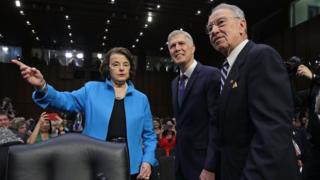 Image copyright
Image copyright
Getty Images
Committee leaders Chuck Grassley (R) and Dianne Feinstein with Neil Gorsuch
Senators have clashed fiercely at the confirmation hearing for Donald Trump’s Supreme Court nominee Neil Gorsuch.
The seat was vacated by the death of Justice Antonin Scalia 13 months ago.
There were angry exchanges among Democrats and Republicans over why Barack Obama’s choice for the post had not been given a hearing last year.
Mr Gorsuch is yet to be questioned, but in a short address strongly backed an independent judiciary and said that judges cannot by lawmakers.
He largely took a back seat on the first day of the Senate Judiciary Committee hearing. He faces a tough grilling on Tuesday and Wednesday.
Before he spoke, Democrats lined up to berate Republicans for blocking Mr Obama’s nomination of federal appeals court judge Merrick Garland as Justice Scalia’s replacement.
Ranking Democrat Dianne Feinstein said she was “deeply disappointed that it is under these circumstances that we begin this hearing”.
Democrat Senator Dick Durbin told Mr Gorsuch: “Your nomination is part of a Republican strategy to capture our judicial branch of government.”
Fellow Democrat Senator Sheldon Whitehouse said he feared Mr Gorsuch’s appointment could lead to another “Republican 5-4 special interest spree”.
If Mr Gorsuch, 49, is approved by the Senate he would restore a 5-4 conservative majority on America’s highest court.
But Senate Republicans pointed to a quote by then Judiciary Committee chairman, the Democrat Joe Biden, in 1992 saying then President George HW Bush should not name a nominee to any Supreme Court post until after the upcoming election.
Senator Lindsey Graham said if the Democrats had been in the same position last year they would have acted the same way.
“I don’t think any injustice has been done,” he said.
Republican Ted Cruz said “Justice Scalia’s legacy would have been in grave danger” if Mr Obama’s choice had been allowed.
How does the process work?
- Monday: Each of the 20 committee members reads a 10-minute statement, followed by Mr Gorsuch
- Tuesday-Wednesday: Mr Gorsuch to be questioned on a range of political and legal issues
- Thursday: Outside witnesses testify for or against the nomination
- Committee vote: Members report the nomination to the full Senate, favourably, unfavourably or without recommendation
- Senate procedural vote: Republicans have a 52-48 majority in the Senate but Democrats can push to raise the required threshold to 60 votes. If they do, Republicans can use the so-called “nuclear option” to change the rules to allow a lower vote threshold
- Senate full vote: Will be a simple majority, if the above procedural hurdles are overcome
“We would have seen the democratic process controlled by five unelected lawyers in Washington DC,” he said.
In delaying the choice until after the election, “the American people played a very direct role in choosing this nominee”, he said.
As far as Mr Gorsuch’s qualification for the post was concerned, senators did not dispute his achievements.
Committee chairman, Republican Chuck Grassley, hailed Mr Gorsuch’s “exceptional record”, saying he had shown unfailing commitment to “the preservation of our constitutional order and the separation of powers”.
Mr Graham, although pointing out his well-known opposition to Donald Trump’s election campaign, said the president should be praised for picking the “best choice available”.
When he came to speak, Mr Gorsuch championed neutral judges and an independent judiciary, saying: “Each generation must carry the baton or watch it fall.”
He said: “If judges were just secret legislators, declaring not what the law is but what they would like it to be, the very idea of a government by the people and for the people would be at risk.”
He added: “These days we sometimes hear judges cynically described as politicians in robes, seeking to enforce their own politics rather than striving to apply the law impartially. If I thought that were true I’d hang up the robe.”
Some Democrats hinted at the issues that would form part of his grilling over the next two days:
- Closeness to Donald Trump. Senator Patrick Leahy asked: “Will you rubberstamp a president whose administration has asserted that executive power is not subject to judicial review?”
- Abortion. Raised by Ms Feinstein, who emphasised the landmark 1973 ruling, Roe vs Wade, was a “super precedent” that should be protected
- Employer rights. A number of senators raised, and condemned, Mr Gorsuch’s ruling supporting a transportation firm that sacked an employer for defying an order to stay in a freezing, broken-down lorry
It is unclear whether Democrats will try to block Mr Gorsuch’s confirmation.
If they do, their options are limited.
Republicans control the Senate and they can change the chamber’s rules to make it easier to confirm Mr Gorsuch if any attempt is made to block him.
They hope to have Judge Gorsuch, currently a judge on the Denver-based 10th US Circuit Court of Appeals, confirmed before Congress leaves for recess on 7 April.
Image copyright
Getty Images
Justice Scalia (front row, second from left) was one of five justices that made up the conservative majority on the court
Supreme Court nominee: Senators clash at Neil Gorsuch hearing

